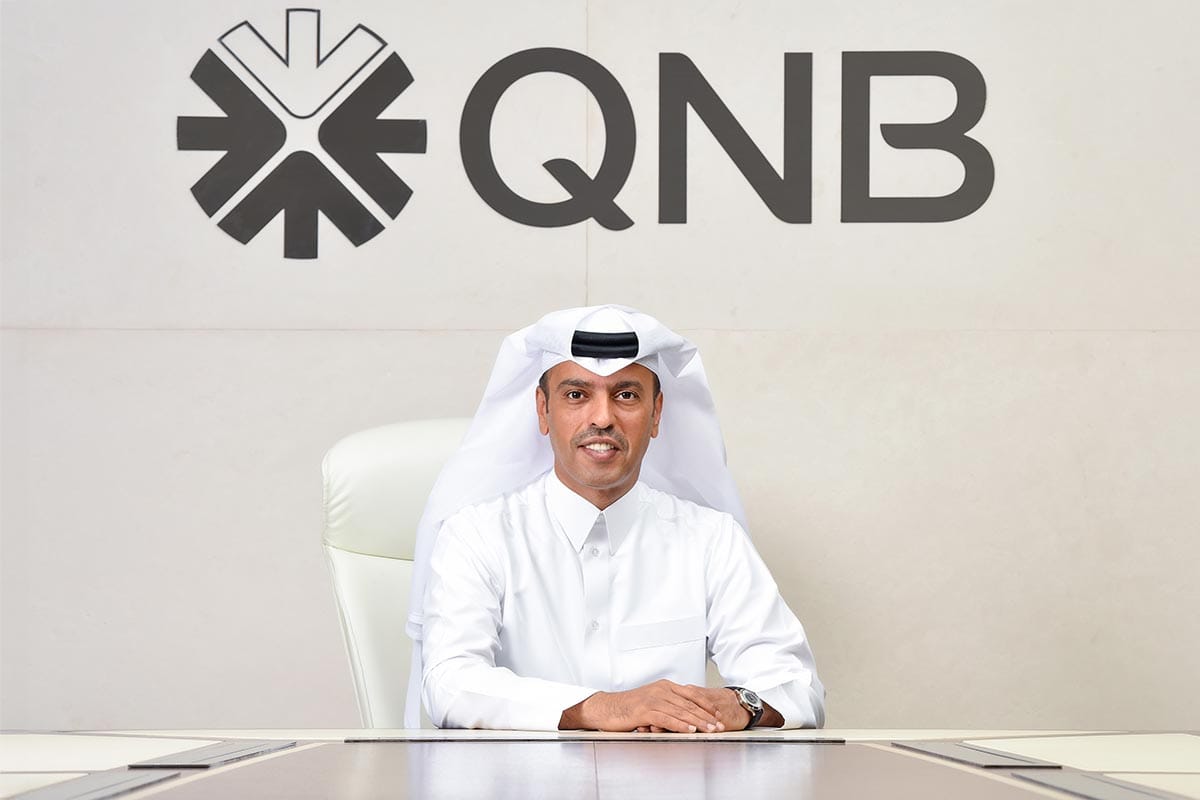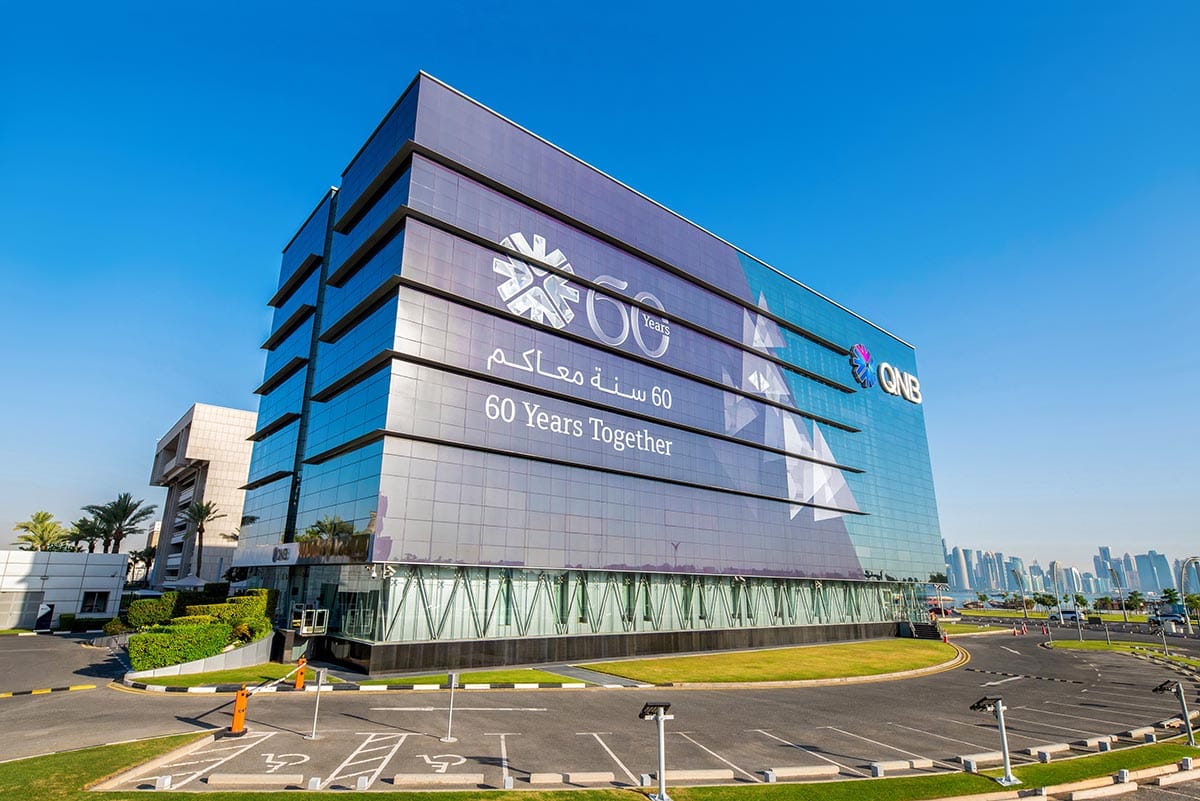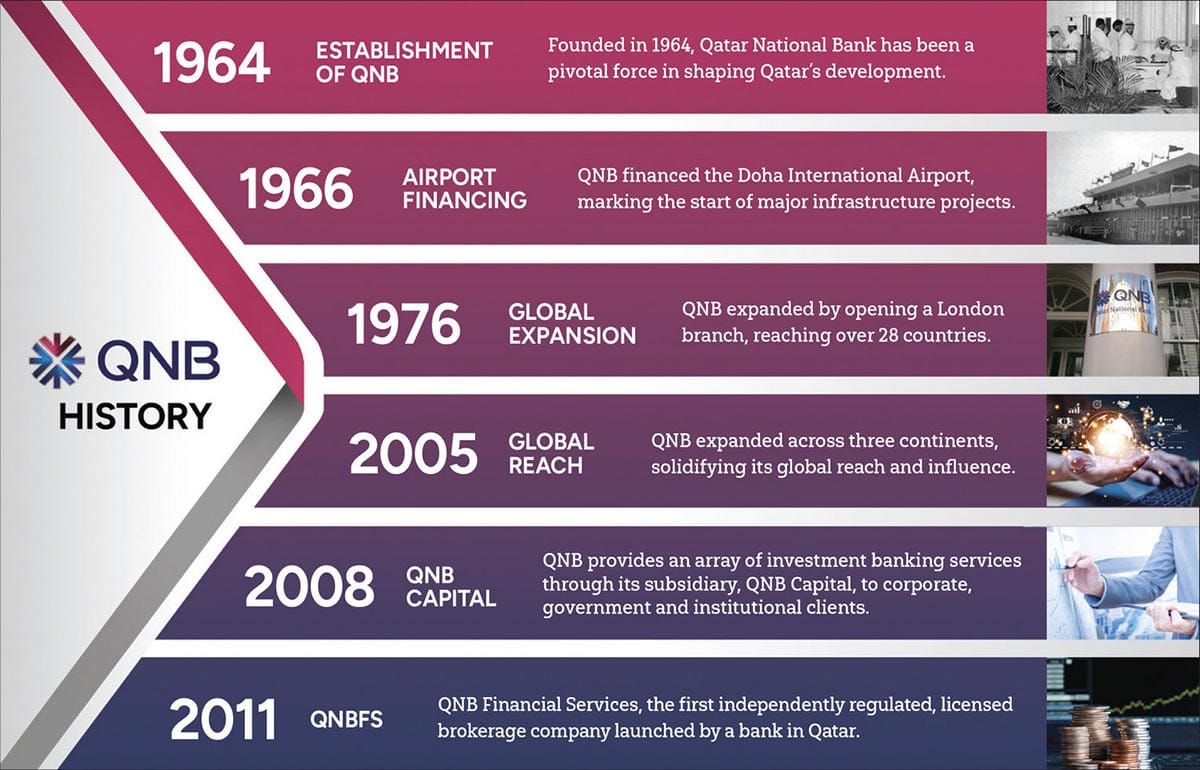Since its inception in 1964, Qatar National Bank has evolved from a pioneering financial institution into a global powerhouse with a footprint spanning over 30 countries. From its beginnings as a modest yet forward-thinking bank in Qatar to its current status as a major international figure in the financial sector, QNB underscores its role as a cornerstone of the banking industry. Its evolution reflects a blend of innovation, resilience and a deep commitment to its customers and communities. This milestone 60th anniversary mirrors not only the bank’s tremendous growth, but also its agility, as well as its ability, to adapt within the ever-changing banking landscape.
In this interview, QNB Group CEO Abdulla Mubarak Al-Khalifa highlights key achievements and strategic shifts that have shaped QNB’s current position. The discussion also covers QNB’s vision, emphasizing the strategies in place to maintain its leadership in the banking sector, both regionally and globally.
This insightful conversation likewise addresses QNB’s commitment to sustainability, examining the challenges and opportunities in integrating sustainable practices into its operations. Additionally, Al-Khalifa delves into how the bank is embracing digital transformation while preserving the essential human elements of banking. Finally, the CEO shares insights on QNB’s Japanese partners, marking the importance of this relationship in achieving mutual goals and fostering future collaboration.
Bridges: As QNB marks its 60th anniversary, how would you describe its evolution over the past six decades?
Abdulla Mubarak Al-Khalifa: QNB was established in 1964 as the country’s first fully Qatari-owned bank and started its international journey in 1976 with the opening of a branch in London. In 2005, when QNB was the 16th-largest bank in the Gulf Cooperation Council, it put together its first ambitious five-year strategy, the objective of which was to become one of the top three banks in the GCC. Over the next 10 years, QNB underwent an international expansion that saw the establishment of operations in 15 countries through organic and inorganic growth. This expansion was crowned with two major acquisitions in the region, in both Egypt and Turkey. Today, QNB Group is the largest bank in the Middle East and Africa, and for the past 11 years it has been recognized as the most valuable banking brand in the region and the 39th globally.
During our international growth, we remain faithful to our Qatari roots and heritage, as well as to our DNA as a corporate wholesale bank, serving Qatari society and supporting the growth trajectory of our country.
QNB has built a proud legacy. Looking ahead, what is QNB’s vision and how do you intend to remain the leader in the region?
QNB’s vision is to be one of the leading banks in the entirety of the Middle East, Africa and Southeast Asia regions, while maintaining our No. 1 position in the Middle East and Africa. We intend to remain at the forefront of banking in the region through a disciplined execution of our strategy. Our strategy is comprised of three elements: focus on our core of being an international wholesale bank, while leveraging innovation as a strategic enabler and embedding sustainability into our business and operating model.
QNB’s vision is to be one of the leading banks in the entirety of the Middle East, Africa and Southeast Asia regions, while maintaining our No. 1 position in the Middle East and Africa.
Abdulla Mubarak Al-Khalifa, Group Chief Executive Officer of QNB
Focusing on our core means further uplifting our wholesale banking capabilities across our network. As such, we rely on our DNA as a wholesale bank, and are further enhancing our value propositions as a solution-led wholesale bank, complemented by an analytics- enabled global transaction banking proposition. The second element of our strategy is to leverage innovation as a strategic enabler. Our innovation approach aims to achieve meaningful bottom-line impact and new revenue-generating opportunities. By capitalizing on developments in areas such as open banking, big data and analytics and artificial intelligence, as well as digitization and automation, our innovation strategy will benefit the bank and all our stakeholders. At the same time, we acknowledge the importance of sustainability to deliver positive impact along topics related to environmental, social and governance issues. Our strategy aims to embed sustainable practices across our business and operating model.
What are the sustainability challenges and opportunities in banking and how is QNB building that into its ethos and operations?
Corporate sustainability is the delivery of long-term value in financial, environmental, social and ethical terms. Banks play an important role in contributing to financial stability and economic growth. As the largest financial institution in the Middle East and Africa, we recognize the importance of ESG and have consequently embedded the topic of sustainability in our purpose and strategy. QNB’s purpose is to promote prosperity and sustainable growth across the markets we serve. This captures and reflects our efforts from a social and environmental perspective. Our strategy, therefore, fully integrates the topics of E, S and G across our business and operating model.
How is QNB embracing the topic of digital transformation and innovation while maintaining the “human” side of banking?
As part of our strategy, we are embedding the topic of innovation and digital transformation into our business and operating model. Our QNB digital 3.0 transformation program focuses on investing in our information technology capabilities to enable digitization through the adoption of new technologies and uplifting of our IT architecture and infrastructure.
We are leveraging innovation to drive efficiency and automation through robotics, AI, machine learning and an ongoing streamlining of our processes. Last but not least, we are striving to optimize our channels and network on an ongoing basis, to adjust to new customer expectations and behaviors.
Despite the drive of technological advancement across our business, we value the personal relationship and the human element of banking. Our value proposition is supported by cutting-edge digital technology and innovation delivered with a human touch to maintain the highest levels of customer satisfaction. By digitizing and transforming our products and processes, we are automating or providing self-service for low-value tasks, which in turn enables our relationship managers and frontline staff to have more — and higher value-added — face-to-face interactions with our customers.
What message would you like to share with QNB’s valued Japanese partners?
Japan and Qatar share strong and long-lasting economic ties, with Japan being one of the most important trading partners for our country. Several Japanese companies are trading with and operating in Qatar, supporting its development. Over time, the relationship between Japan and Qatar has expanded beyond energy and infrastructure. We are collaborating in the fields of research and development, science and education, agriculture, tourism and culture, helping to further strengthen our bilateral relationships.
QNB’s network, rating, brand and relationships make us a strong, reliable, and trusted partner for the banking needs of our clients. Our extensive market knowledge and experience help us in supporting not only local and multinational corporations, but also SMEs (small and midsize enterprises), by being a trusted financial partner to provide sophisticated solutions.
We have also established strong and growing relationships with leading Japanese banks, across all our activities. This allows us to facilitate financing opportunities for trade, infrastructure and investment flows on a bilateral basis.
We look forward to those ties evolving and prospering in a mutually beneficial way for the benefit of our customers, partners and both countries.






